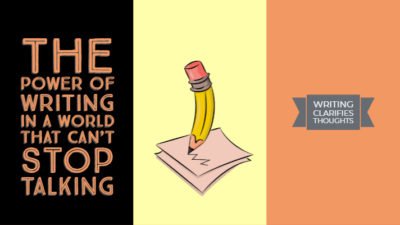
Benefits of writing/How Writing Can Help?
In an individual gaining acceptance and proving one’s significance is an important life goal.
While recognition, money and fame may be the most prominent by-products of writing, there are several other benefits of writing as well:
1. ‘Writing works like a Therapy’
Jennifer Haupt, a writer, identifies her writing fiction as an anti-depressant.
When you pour your thoughts-on paper as words and sentences, they tend to influence our emotions too. Our thinking becomes much clearer. It provides a mean to untangle thoughts and to rationalize them. As you gain further insight because of writing, it is nothing less than a therapeutic experience, as Kathy Lette, an author, had once expressed in an interview, “I only write because it’s cheaper than therapy”.
Writer and Stanford University Associate Professor Adam Johnson states that telling a trauma narrative is therapeutic for anyone who has a traumatic story to tell even if they write that as traditional fiction.
A new brain imaging study by UCLA psychologists revealed that talking about our feelings makes our sadness, anger and pain less intense.
2. ‘Writing helps in Venting out’
Writing is cathartic for:
a) Inhibited individuals who are looking for a platform to express their bottled-up ideas and emotions.
b) While many forbidden things/ideas might be difficult to negotiate with in real life, writing provides a means to express that discontent.
c) The atrocities and exploitation faced by sections of the Indian population because of their caste, race and gender. It was difficult for these people to rise against the discrimination and be heard. Writing became a means to let out their frustration and express their anger against the injustice being meted out.This works for all children and adults too.
Short story writing by Indian women authors often express discontent with the miseries of the upper-caste traditional Hindu women who are trapped in repressive institutions that largely remain concealed. Shashi Deshpande’s work, “That Long Silence” effectively showcases the dilemma and a series of events leading to identity crisis of a woman, inflicted on her by an oppressive husband.
Jhumpa Lahiri, in her fiction, frequently expresses her own experiences as well as those of her parents, friends, acquaintances, and others in the Bengali communities with which she is familiar. She examines her characters’ struggles, anxieties, and biases to outline the behavior of immigrants.
Miseries of childhood and disturbed interpersonal relations becomes a recurring theme in the fictional works of Dhanpat Rai (Munshi Premchand), one of the most celebrated writers of India.
Dr. Matthew Lieberman, a neuroscientist at the University of California, discussed his findings in a lecture at the American Association for the Advancement of Science titled ‘Putting Feelings Into Words’. He said that expressing yourself in print was “a sort of unintentional emotion regulation”.
3. Writing helps in Imagination and creative pursuits
One can travel infinite distances, not in behavior, but on paper most of the times. Thus, writing provides that necessary escape from mental barriers to pursue creativity. Writing makes a great platform for creative visualization, brainstorming and out of the box thinking, since everything seems plausible on paper. All one needs to do is to keep writing without judging the effectiveness of a thought.
4. Integration of ‘self’
Sometimes it is difficult to clearly visualize what led to such an experience. However, when an individual starts writing, the process enables one to visualize an event unfolding. Moreover, while writing, we tend to express certain episodes with a lot of surety and clarity, while some of the other portions seem ambiguous and shallow. This is also an indicator of how willing a person is to intellectually and emotionally identify with an episode or topic. Thus, writing becomes a mirror like reflection of one’s conflicted mindset and a means to fix one’s fragmented self.
Thomas E. Kennedy, an author of more than 30 books, went on to identify writing as a spiritual discipline. The single most important reward of writing, he says, is the act of writing itself.
![]() This article has been contributed by Shivani, a psychologist. Benefits of writing, a psychologist view point.
This article has been contributed by Shivani, a psychologist. Benefits of writing, a psychologist view point.
Shivani is an experienced Counselor- Psychology Educator. She has been working with adoloscents for the past several years.She completed her Postgraduate in Applied Psychology from Delhi University.
I’m doing quotes of several kinds not able to find out the actual website or link to publish hence forth waiting for the reply from your end.
Regards
Robin
Hi Rakshit
Do write to us at info@zorbabooks.com
I written my poem i want to publish
Dear Ambrish
You can write to us at info@zorbabooks.com or speak to our publishing consultant on 0124-4259579 and we will be happy to help you